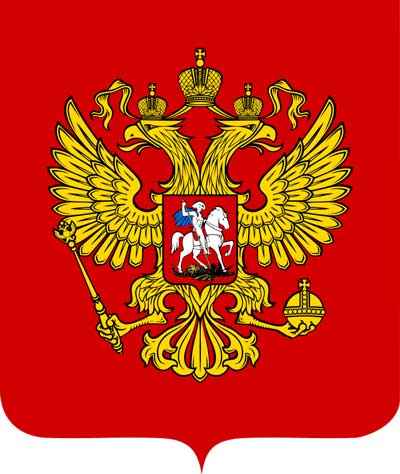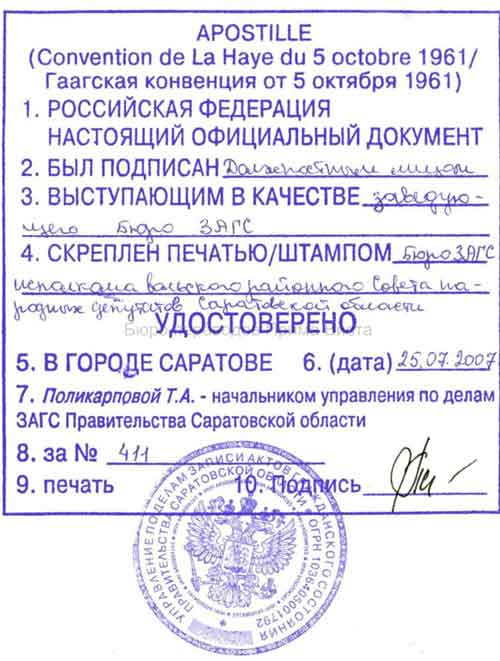
Schmidt & Schmidt covers the full spectrum of consular legalization and apostille services for documents issued in Russia.
Russia has joined the Hague Convention Abolishing the Requirement of Legalization for Foreign Public Documents in the year 1992. Therefore no diplomatic authentication or legalization of documents from Russia is required for the legal communication with another member state of the Convention. The documents only need to be attested by an apostille certificate with an "apostille" stamp on it by the issuing state's authorities in order to be valid in the state of destination.
The apostille is a stamp of rectangular shape. It should be filled in in the official language of the issuing authority. The heading "Apostille (Convention de la Haye du 5 octobre 1961)" written in French is a mandatory requirement for an apostille's validity.Responsible for issuing the apostille are the following institutions:
- Registries
- Ministry of Justice
- Ministry of Domestic Affairs
- Ministry of Defense
- Educational Inspectorate
- Archive Offices

The following documents can be authenticated by apostille:
- Certificates of civil status (certificates of birth, death, marriage and divorce)
- Education documents (school reports, certificates, diplomas)
- Extracts from the commercial register
- Judicial decisions*
- Notarially certified copies of documents
- Notarially certified translations
- Further notarial documents (authorizations, last will, declarations)
- Commercial documents legalized by a state organ of registration (articles of incorporation, registration certificates, tax registrations etc.)
Documents not subject to legalization or apostille
- Employment records, military IDs, and identity cards cannot be exported or sent abroad and are not accepted for legalization in either original or copy form.
- According to international practice, passports and equivalent documents do not require legalization.
- The Hague Convention does not apply to documents issued by diplomatic or consular offices, as well as documents directly related to commercial or customs operations.
- Documents that contradict the legislation of the Russian Federation or could harm the interests of the Russian Federation are not subject to legalization.
- The legalization procedure may be overridden by provisions of international treaties in which the Russian Federation participates.
Document requirements
An apostille can only be affixed to the original document or to a notarized copy if the apostille cannot be placed on the original (for example, a passport or driver’s license). Documents must be in good condition, with clearly visible stamps and signatures. There should be no extraneous marks or inscriptions on the documents. Civil registry offices may refuse to affix an apostille to documents issued in the USSR. In such cases, it is necessary to obtain a replacement document issued after the USSR period.Exemption from apostille and consular legalization
According to Art. 13 of the Convention on Legal Assistance and Legal Relations in Civil, Family and Criminal Matters (also called the Minsk Convention), the documents of the participating countries do not require legalization. Russia has been a party to the Minsk Convention since 1994. Other countries that are parties to the Convention are Armenia, Azerbaijan, Belarus, Georgia, Kyrgyzstan, Moldova, Russia, Tajikistan, Turkmenistan, Uzbekistan, and Ukraine. For these states, an apostille certificate for documents issued in Russia is not required; instead, a notarized translation will suffice.
Legalization of Russian educational documents for use abroad
Legalization of educational documents is a procedure for giving a diploma or certificate legal force in the territory of another state. It exists so that further actions can be performed with the document not only in the country where it was obtained, but also abroad. Often, legalization is a mandatory, although not the only requirement for an educational document when entering abroad.
There are two types of document legalization:
- Consular legalization. It is a complex bilateral procedure that involves certification of the document by government agencies at various levels. As a rule, this is a notary, the Ministry of Justice, the Ministry of Foreign Affairs of the country that issued the document, and the consulate in the country of study. The procedure for legalizing an educational document consists of several stages and is described in detail in the section on consular legalization of Russian documents for use abroad.
- Apostille. It is a simplified legalization procedure adopted in the countries participating in the Hague Convention of 1961 (118 states in total). It involves placing a special mark / stamp - an apostille - on the originals or copies of documents. The original diploma and the transcript, stitched together, are affixed with one apostille and certified by the Moscow City Department of Education and the MFC (Multi-Functional Center of services) for the implementation of certain powers.
Consular legalization of Russian documents for use abroad
Should a document be used in a country that does not recognize the Hague Convention the procedure of consular legalization, also called “embassy attestation”, applies. For a complete list of countries that accept and use apostilles, click here.
Consular legalization is the process of authenticating or certifying a legal document so a foreign country's legal system will recognize it as with full legal effect that is carried out by the diplomatic or consular mission of the country in which the document is to be used.
There are 2 types of legalization process in the Russian Federation: via the Ministry of Foreign Affairs of the Russian Federation and via The Chamber of Commerce and Industry.
Legalization via the Ministry of Foreign Affairs of the Russian Federation is carried out in several stages:
- Making notarized copies of original documents
- Notarized translation into a foreign language - of your choice
- Legalization at the Ministry of Justice
- Legalization at the Ministry of Foreign Affairs of the Russian Federation
- Certification at the embassy of a destination country
Legalization via the Chamber of Commerce and Industry for commercial documents (certificate of origin, invoice, agency agreement, etc.) is carried out in 2 stages:
- The Chamber of Commerce and Industry certifies the original document
- The embassy of the destination country certifies the document
The main differences between an apostille and consular legalization of documents
The common feature between apostille and consular legalization is that they authenticate an official document for presentation to institutions in another country. However, they have many differences.
| Apostille | Consular legalization | |
|---|---|---|
| Validity | Can only be used between countries that are members of the Hague Convention on the Simplified Legalization of Documents. | Use between States one or both of which is not a member of the Hague Convention, or where one of the contracting States has protested the accession of the other |
| Obtaining difficulty | Moderate. To obtain an apostille, contact the competent authority of the country where the document was issued | High. For consular legalization must contact various authorities and consulates of the country where the document was issued. |
| Advance Authentication | Not required | A prior certificate from the issuing authority is required |
| Legalization at the Consulate of the country of destination | No need to contact the Consulate of the country of destination | The final step of legalization takes place in the consulate of the country of destination, usually in the country of issue |
Apostille and consular legalization in all cities of Russia
Schmidt & Schmidt provides apostille and consular legalization services for public documents originating from all regions across the Russian Federation. We handle the entire process, from document review to obtaining the necessary certifications, ensuring that your documents are valid and recognized internationally. With our reliable services, you can confidently use your Russian public documents abroad.
Procurement of documents from Russia
If the important documents are lost or damaged, or current copies of the documents are needed, the re-issue of the documents is required. It is not unusual for people outside Russia to encounter difficulties with obtaining new documents when abroad. Our consultants will help you procure new documents from Russia remotely, and we can arrange for your documents to be sent by courier anywhere in the world.
Certified translation of documents from Russia
Copies and transcripts of civil status documents can be translated into any language by a sworn translator in the Russian Federation or the translation can be done in the country of destination. We offer certified translations of civil status documents with further certification. The cost of the work is calculated according to the volume of the document in question.Does the translation have to be apostillized?
Any foreign document issued in one country and required for use in another country must be legalized. Russian civil status documents must be translated by a sworn translator into the language of the request and notarized, then legalized by the Ministry of Justice, the Ministry of Foreign Affairs and the consulate of the destination country.

























































